In this roundup of court judgements, we look at Constitutional Courts’ remarks & directions about SC/ST belonging to one state claiming benefits in another state, membership of five or more being an essential condition for unlawful assembly, allowing termination of 28-week pregnancy due to foetal abnormalities, directions to CBSE to consider ‘best of two’ exams for final results, compensation to be paid immediately if a person is deprived of possession of his property on account of the acquisition of land.
Supreme Court: An SC/ST belonging to one state cannot claim the benefits admissible to such community in another state to which they have migrated
In Bhadar Ram (D) vs. Jassa Ram, the Supreme Court held that a Scheduled Caste (SC) belonging to or being an ordinarily and permanent resident of the State of Punjab cannot claim the benefit of an SC in the State of Rajasthan for purchasing land. The observation was made by the Apex Court when hearing a dispute with respect to a piece of land in Rajasthan that was allotted to Chunilal, an SC landless person and father of the respondent, Jassa Ram. According to the respondent, in 1972, Chunilal had borrowed Rs. 5,000 from Puran Singh who belonged to Jat High Caste. Puran Singh had fraudulently made Chunilal sign the sale deed in favour of the Appellant, Bhadar Ram, who was an SC from Punjab.
Chunilal later filed suit for ejectment against Puran Singh and Bhadar Ram since he was the allottee of land and sale deed was void and ineffective, and that it violated Section 42 of the Rajasthan Tenancy Act of 1955 and Section 13 of Rajasthan Colonization Act of 1954. The Trial Court held that the sale deed violated the said legislation and so, Puran Singh was liable to be evicted. It was observed that Bhadar Ram was the Benami holder for Puran Singh. The land was in possession of Puran Singh.
Dissatisfied with the decree, Bhadar Ram took the case to the Board of Revenue, where he was granted the benefit of compounding upon payment of compounding fees under Section 13 of the Rajasthan Colonization Act, 1954. Chunilal, who was not satisfied with the Board’s decision filed a writ petition in the High Court, which held that the appellant (Bhadar Ram) being the resident and SC belonging to Punjab, could not take the benefit of his being SC in Rajasthan.
Bhadar Ram then appealed to the Supreme Court of India. The Bench comprising of Justices MR Shah and AS Bopanna noted that Bhadar Ram claimed to be a resident of Rajasthan just because his grandfather and father had land in the state. The Bench invoked the Representation of the People Act, 1950 and stated that holding land in Rajasthan does not lead to the conclusion that the person belongs to that State (using the definition of ‘Ordinarily Resident’). Further, there was no evidence of his birth in Rajasthan.
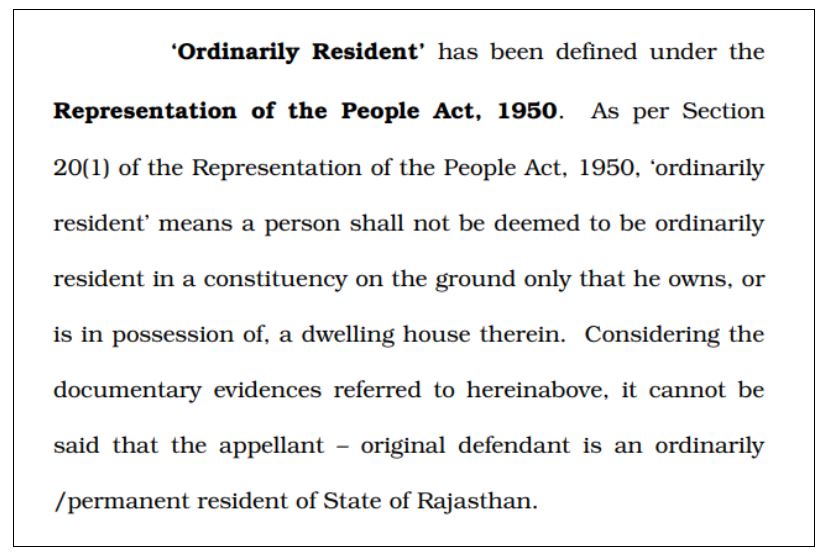
It noted that Section 42 of the Rajasthan Tenancy Act puts restriction on the sale, gift, or bequest by a person belonging to SC in favour of a person who doesn’t belong to SC, to protect SCs belonging to the State. The Bench added that the social condition of the community varied from State to State and so, it would not be appropriate to generalize any Caste or Tribe as SC/ST at the national level.
The bench referred to the decisions in ‘Action Committee on Issue of Caste Certificate to SCs and STs in the state of Maharashtra & Another vs. Union of India & Another (1994)’, ‘Marri Chandra Shekar Rao vs. Dean, Geth G.S. Medical College & Others (1990)’, and subsequent judgements, and dismissed the appeal as the land transaction violated Section 13 of the Rajasthan Colonization Act, 1954 and Section 42 of the Rajasthan Tenancy Act, 1955.
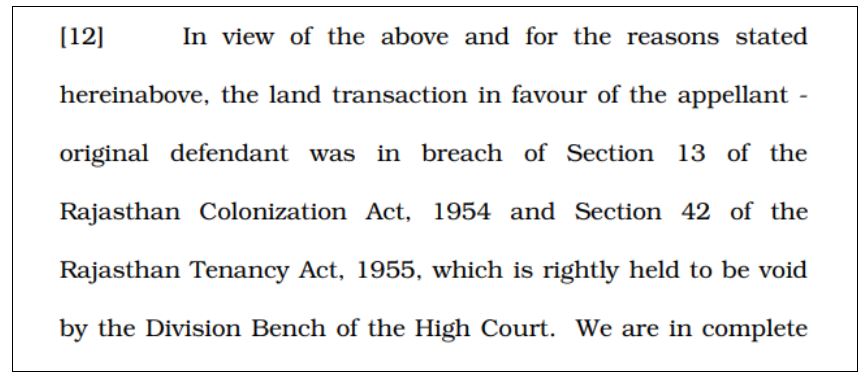
Supreme Court: Membership of five or more is an essential condition for unlawful assembly
Complaints were lodged against Mahendra Singh, Roop Singh, Khilan Singh, Bhujbal and 10 to 12 more persons and 17 other persons alleging that in 2004, the complainants had gone to a village to lift the engine of a tractor and while they were returning, a gang of 20 persons had come there with lathi and farsa and started abusing and assaulting them. In 2018, the High Court of Madhya Pradesh upheld the Trial Court’s conviction of the persons involved in the assault for an offence under Section 325 read with Section 149 of IPC, and sentenced them to one-year rigorous imprisonment and a fine of Rs. 500, and in default, an imprisonment for one month.
Mahendra Singh and others (Mahendra vs. State Of MP) then appealed to the SC claiming that the charge sheet was originally filed against 20 persons and all of them faced trial and 17 out of 20 accused persons were acquitted by the Trial Court and that the remaining three accused were convicted under Section 325 and Section 149 of IPC. Further, they stated that Section 141 required that unlawful assembly requires a minimum of five or more persons.
The SC bench comprising Justice Ajay Rastogi and Abhay S. Oka said that it is an essential condition of an unlawful assembly that its membership must be five or more. Further, it may not be necessary that five or more persons necessarily be brought before the Court and convicted. Less than five persons may also be charged under Section 149 in the condition that the persons before the Court and others being persons not identified and unarmed (more than five persons in total) constitute an unlawful assembly.
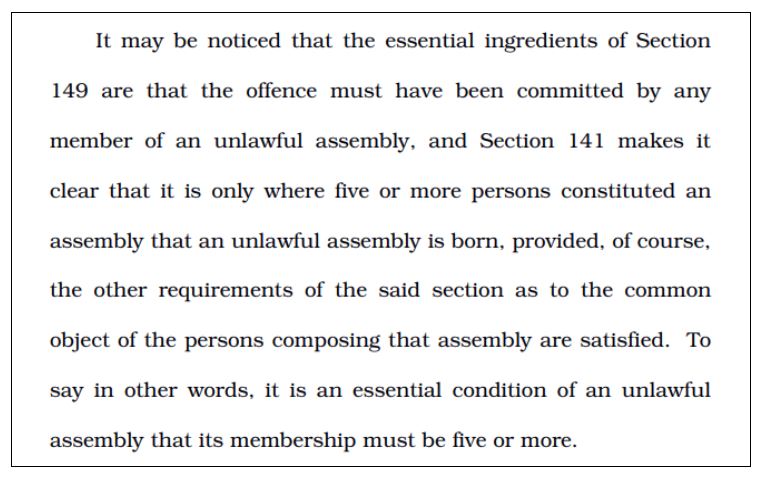
The Bench, noting that the co-accused persons faced trial and were acquitted, stated the following:
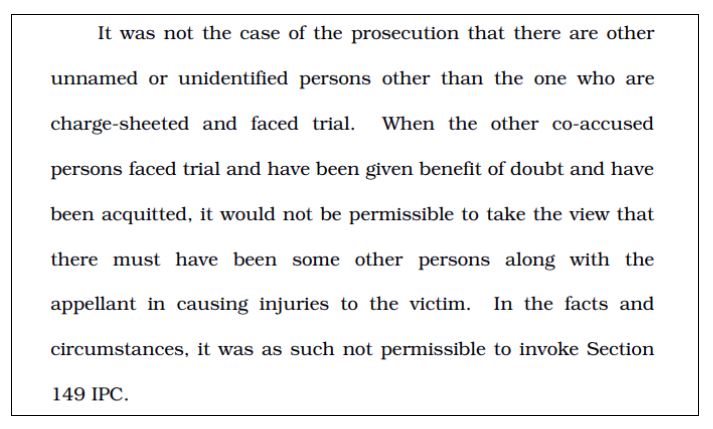
The bench allowed the appeal, quashing the Trial Court and HC’s conviction.
Delhi HC: Allows termination of 28-week pregnancy due to foetal abnormalities
In Sangeeta Thapa vs. Government of NCT Of Delhi & Ors., the petitioner, a 28-year-old pregnant woman, sought medical termination of her 28-week pregnancy since the foetus was suffering from a rare condition such that the child was not likely to survive beyond one year with continued medical assistance, as per medical opinion. This would take a toll on her physical and mental health.
The Court noted that plain reading of Section 3(2)(b)(i), 3(2)(b)(ii) and 3(2B) of the Medical Termination of Pregnancy Act states that medical termination of pregnancies can in certain situations be allowed, even where the duration of the pregnancy exceeds 24 weeks.
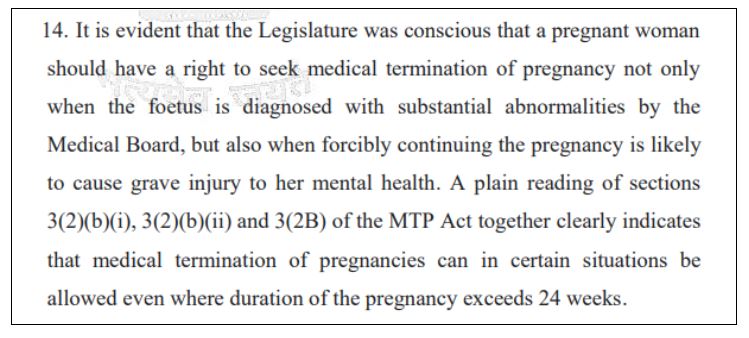
Referring to recent judgements, Pratibha Gaur vs. Government of NCT of Delhi & Ors. (2021), XYZ vs. Union of India, (2019), and Priyanka Shukla vs. Union of India, (2019), the Court stated that if the petitioner is forced to continue with the pregnancy, the petitioner will be put through extreme amounts of mental, emotional, and even financial distress. The Court thus granted permission to the petitioner to undergo medical termination of her pregnancy.
Supreme Court: Directs CSBE to Give ‘Better of Two’ option to students instead of treating improvement exam marks as final
Clause 28 of the CBSE Policy allows students to appear in improvement exams to those who aren’t satisfied with the assessment. However, the policy stated that the marks scored in the improvement exam will be considered as final. This scheme has been inserted without any justification by CBSE, in place of earlier scheme where better of the two marks would be considered for the final result declaration.

In Sukriti & Ors vs. CBSE & Ors, SC bench comprising Justices AM Khanwilkar and CT Ravikumar quashed this policy and directed CBSE to provide options to the candidate to accept the better of the two marks obtained in the subject for the final declaration of his/her results.
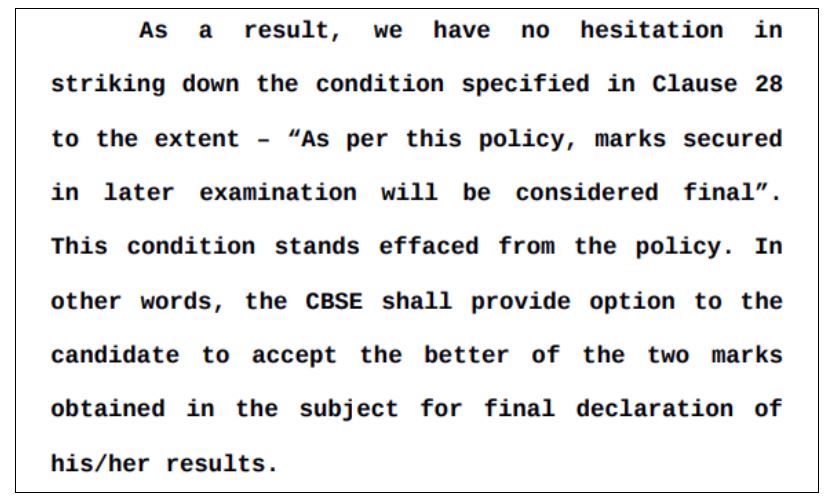
Supreme Court: Compensation should be paid immediately if a person is deprived of possession of his property on account of the acquisition of land
In Gayabai Digambar Puri (Died) vs. Executive Engineer, the issue was whether the liability to pay interest commences from the date of taking possession or only from the date of the award. The reference court directed that the interest be paid from 4 April 1997 when possession was taken until 3 April 1998 for the first year at the rate of 9% per annum and thereafter at the rate of 15% per annum from 4 April 1998 till the date of payment, 8 September 2004.
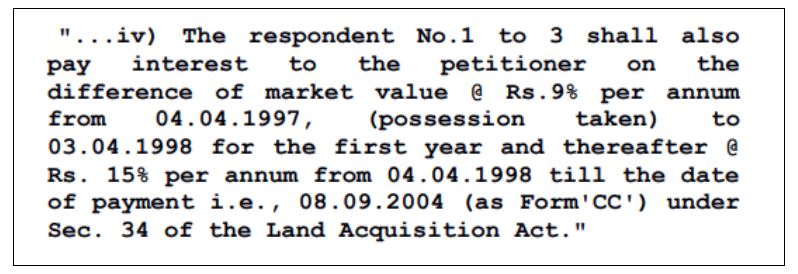
The High Court overturned the judgement. The SC bench comprising Justices AM Khanwilkar and CT Ravikumar in the current appeal restored the Reference Court’s directions and stated, “the normal rule is that if on account of the acquisition of land, a person is deprived of possession of his property, he should be paid compensation immediately and if the same is not paid to him forthwith, he would be entitled to interest on the compensation amount from the date of taking possession of the land till the date of payment”. Thus, the High Court order was modified accordingly.
Featured Image: Important Court Judgements


